
With August right around the corner, I hope you are soaking in all that summertime in Michigan has to offer. Grab a coffee or cold beverage and read on to learn about what we have been working on in Lansing.
As always, if you or someone you know would like to provide any feedback about what’s happening in Lansing, or needs assistance of any sort, please feel free to reach out to my office. You can contact me by sending an email to SenMMcMorrow@senate.michigan.org or calling 517-373-2523.
Sincerely,

Mallory McMorrow
State Senator
District 8
Legislative Updates
State Budget Signed Into Law
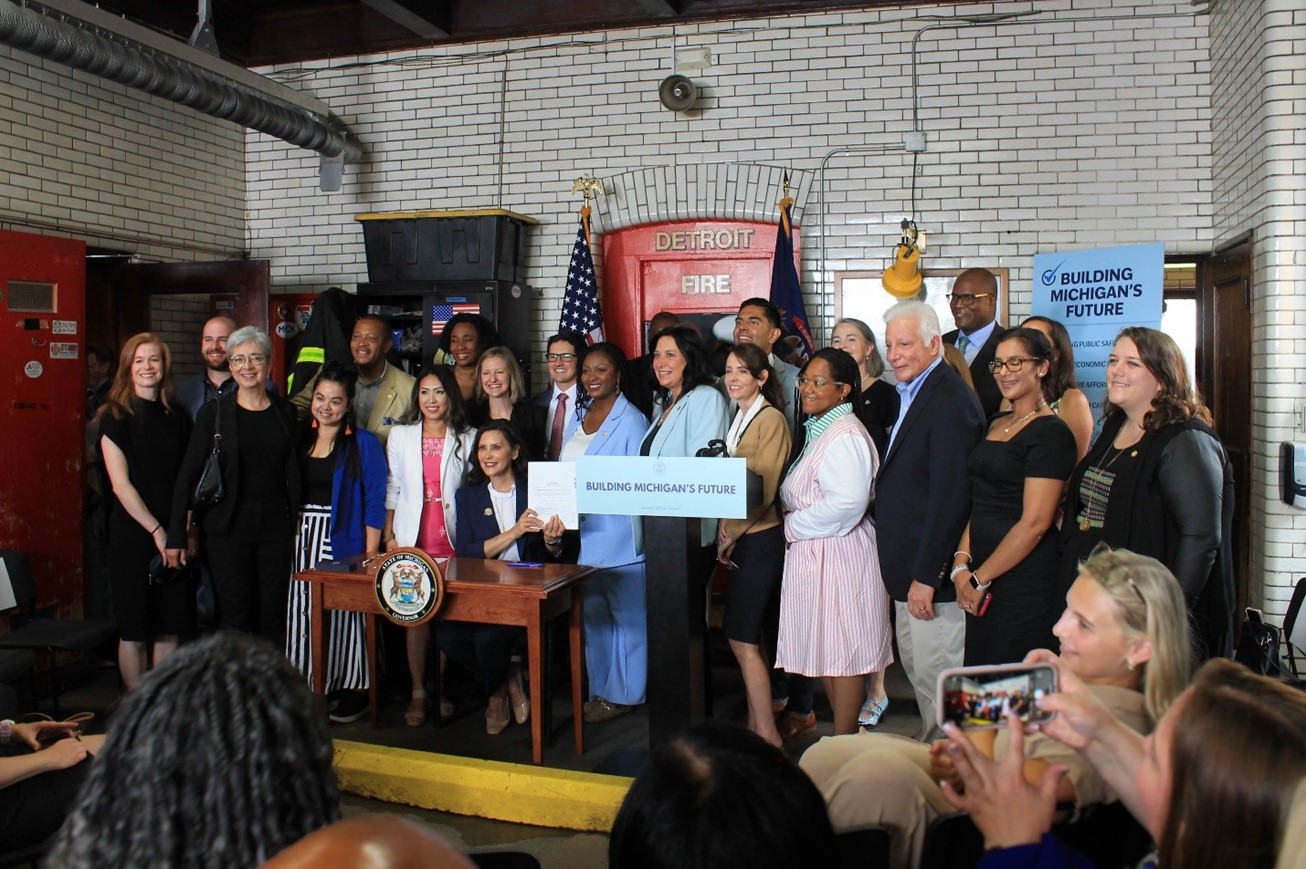
This week, Governor Gretchen Whitmer signed the Fiscal Year 2025 State Budget into law. We are continuing to invest in children and families, students and workers, public safety, community development, and more.
We secured the resources necessary to build up workers and small businesses throughout our state, including funding to:
- Continue Michigan Reconnect, providing a tuition-free pathway to adult learners 25 and older.
- Expand access to free community college for students in every part of the state with the Community College Guarantee. Beginning Fall 2024, students from the Class of 2023 and beyond are eligible for this funding.
- Support Michigan’s current and future workforce needs and population growth, including specialized economic assistance to businesses locating or expanding in Michigan to meet their talent and workforce needs.
- Establish an Innovation Fund to invest in scalable startups and help launch hundreds of new Michigan-based companies, creating thousands of jobs.
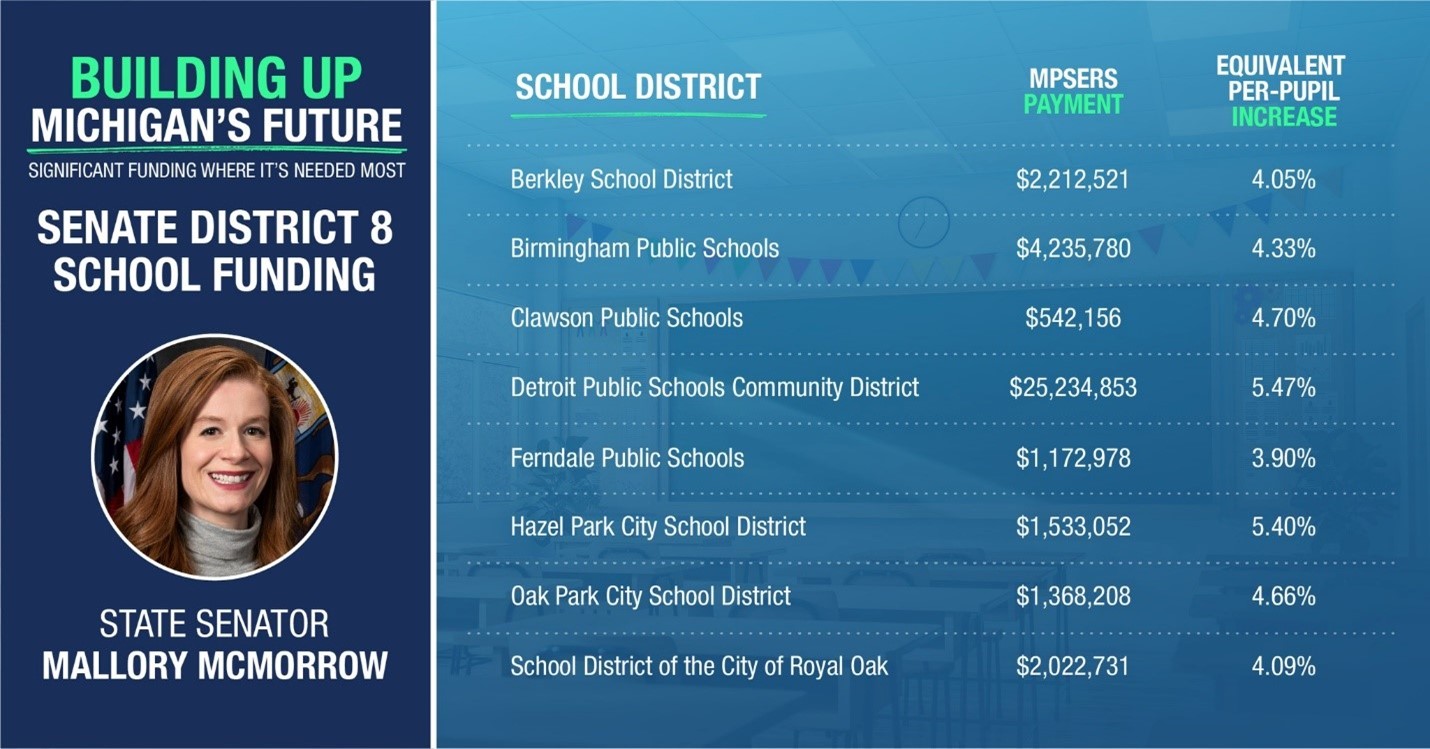
Thanks to our fiscal responsibility over past years, the healthcare portion of the Michigan Public School Employee Retirement System (MPSERS) was completely funded as of this year. However, teachers and schools would have still been required by law to pay a percentage into this fund – where those dollars would simply have sat unused.
In this year’s budget negotiations, school groups asked for a 7% reduction in MPSERS payments to account for this change, and we were able to meet them almost entirely there with a 5.75% reduction. Additionally, teachers will effectively receive a 3% pay increase since they will no longer have 3% of their paychecks deducted to pay into this system. These are dollars directly back into our schools’ and teachers’ pockets, and in the above graphic, you can see what that equates to per pupil for each of our school districts.
By leveraging these dollars in this way, it freed the legislature up to fund some of the more aspirational goals of both the legislature and the governor — including significant increases to early childhood education that gets us on track to universal pre-K in the state of Michigan, as well as fulfilling the promise of providing a pathway for every Michigander for tuition-free community college or two years of higher education or skills trainings. Together, we’re getting closer to the vision of a lifetime of learning for every Michigan kid, from pre-K through adulthood.
While the budget considers these MPSERS reductions ongoing (permanent), a partner policy bill was introduced in both the House and Senate to ensure the statute aligns with the budget. While that policy bill stalled out between the two chambers before the final passage of the budget, I’ll continue to push for this bill to make it through the legislature to ensure this change is permanent.
Our office will have information coming regarding more budget items specific to the district, so stay tuned!
Read more about the Building Up Michigan Budget here.
Creating an Environment Where Workers and Businesses Can Thrive
Recently, CNBC ranked Michigan as No. 9 on their list of America’s Top States for Business in 2024 list. This marks the third time since the list was launched that Michigan has cracked the top 10. This announcement comes after Michigan’s unemployment rate fell below the national average, remaining at 3.9% for the fourth consecutive month in May. With all this news, the message to workers and businesses is clear: whether you’re looking for a good-paying job or a place to start a successful small business, Michigan is a state where you can thrive.
We have championed legislation to make this reality possible. Here’s just a few legislative highlights:
- Expanded the Earned Income Tax Credit (EITC), benefiting 750,000 Michigan workers and boosting local purchasing power to add an additional $553 million to our economy;
- Rolled back the unfair and unpopular retirement tax, putting an average of $1,000 back in the pockets of 500,000 seniors;
- Created a process for small businesses to claim a personal property tax exemption for a property with a true cash value between $80,000-$180,000, helping alleviate the financial strains small business owners may face;
- Expanded the Transformational Brownfield Plan program and made housing development projects eligible to receive tax increment financing (TIF) when transforming obsolete and vacant properties, helping to increase access to affordable housing; and
- Provided additional flexibility to businesses to establish Business Improvement Zones, increasing the tools that business owners have at their disposal to build more vibrant, cohesive community centers.
News You Can Use
Important Election Information

The Michigan State Primary is coming up on Aug. 6. Voters will lend their support for candidates running for the U.S. Senate, U.S. House, Michigan House of Representatives, and other local offices. View the full list of candidates here, and view your sample ballot here. We also have an important General Election on Nov. 5.
My office recently sent out a Voter Guide mailer. Here is a digital copy.
In our Voter Guide you will find information on:
- Primary Election August 6
- General Election November 5
- Voter Registration
- Ways to Vote – Absentee or In-Person
- Election reminders
- Other helpful information and resources
Remember to make a plan to vote!
New Renewables Ready Communities Program Set to Launch
Earlier this week, Gov. Gretchen Whitmer announced the U.S. Environmental Protection Agency (EPA) has awarded the State of Michigan $129.1 million from the Biden-Harris administration’s Inflation Reduction Act’s (IRA) Climate Pollution Reduction Grant (CPRG) program to accelerate the deployment of renewable energy like wind, solar, and storage. The investment will help Michigan meet its 60% renewable energy and 100% clean energy standards set under the recently enacted clean energy laws. Getting this done will create good-paying jobs, drive down energy costs, and protect the state’s air, land, and water.
This funding will allow the state to launch Renewables Ready Communities (RRC). Administered by the Michigan Department of Environment, Great Lakes, and Energy (EGLE), the program will incentivize the permitting of renewable energy projects through local processes. The RRC Program will help overcome barriers to siting renewable energy and help the state reach its goal of 60% renewable energy by 2030. Deploying renewable energy at scale is critical to meeting the state’s climate and energy goals, and siting is arguably the most important barrier we face to build more solar, wind, and so much more across Michigan.
Interested communities and stakeholders can reach out to EGLE-OCE@Michigan.gov for more information. Check out EGLE’s website to learn more about the ongoing Renewables Ready Communities Award pilot.
Recognizing People with Disabilities This Month and Beyond

Friday, July 26 is National Disability Independence Day, the 34th anniversary of the passage of the Americans with Disabilities Act in July 1990 — a historic milestone in advancing the rights of all people with disabilities. Since then, Disability Pride Month (recognized each July) has become a celebration of the unique experiences, strengths, and achievements of people with disabilities. It is also a time to recognize that people often face discrimination or marginalization based on their disability, race, gender, sexual orientation, or other intersecting factors.
We strive to create an inclusive and accessible society that enables individuals with disabilities to live fulfilling lives and participate in their communities. Activities during Disability Pride Month are aimed at inspiring all citizens to celebrate the contributions of persons with disabilities, promote inclusivity, and foster greater respect and understanding.
Below are some activities and resources shared by the Michigan Department of Health and Human Services to recognize and celebrate Disability Pride Month here in Michigan:
- Learn more about Disability Pride Month in Michigan
- View the 2024 Breaking Barriers Art Exhibit
- Article: Navigating pregnancy with a disability, Mayo Clinic
- Podcast: Disability Advocacy and Inclusivity in Maternal Health
60th Anniversary of the Civil Rights Act

This month commemorates the 60th anniversary of the 1964 Civil Rights Act, signed into law by former President Lydon Johnson on July 2, 1964. This act banned discrimination based on race, color, religion, sex, or national origin.
The Michigan Legislature expanded the Elliott-Larsen Civil Rights Act to provide protection from discrimination based on sexual orientation, gender identity, or expression. Michigan became the 23rd state to pass these comprehensive non-discrimination laws.
We also extended protections via the CROWN Act, which protects Michiganders from discrimination against natural hairstyles. By protecting natural hairstyles like afros, braids, twists, and locs, the CROWN Act recognizes the beauty and diversity of the people in our state. Michiganders have the right to embrace their natural hair and cultural identity without discrimination in the workplace, school or elsewhere.
There is more work to be done, and we want to ensure that Michigan continues to be a welcoming place for all.
National Lakes Appreciation Month!

In Michigan, we take pride in being known as the Great Lakes State. Our five Great Lakes are the source of 20% of Earth’s total fresh water. In addition to these, Michigan is also home to more than 11,000 inland lakes (You can find one near you using this interactive map).
Our lakes and various waterways are integral to the health of our families and our economy. The Great Lakes system is invaluable as the source of drinking water for more than 40 million people in the U.S. and Canada, and the Great Lakes shipping industry generates more than $36 billion in economic activity and supports more than 664,000 jobs. Our lakes also provide families with unmatched recreational opportunities.
Since taking office, my colleagues and I have:
- Secured over $105 million in the 2025 State Budget for statewide water infrastructure projects, building on the progress made in the previous year’s budget. Funding will go towards replacing lead service lines, rebuilding sewers and more.
- Championed the historic Clean Energy Future package which sets clean energy standards, promotes energy efficiency, and creates the Office of Community and Worker Economic Transition.
- Passed legislation to require environmental protection and cleanup standards to ensure bad actors pay to clean up their pollution, rather than having taxpayers foot the bill.
- Repealed a harmful law that restricted Michigan officials from implementing environmental and public health safeguards beyond federal standards, empowering Michigan to protect its natural resources and environment more effectively.
During National Lakes Appreciation Month, I remain committed to building on this work and advancing legislation to strengthen environmental protections, so future generations of Michiganders can enjoy our state’s lakes for years to come.
The Michigan DNR Wants to Hear About Your Trail Experiences
There’s a reason we’re known as the Trails State — Michigan is home to more than 13,400 miles of state-designated trails and local and regional options that offer something for everyone. This summer, the Michigan Department of Natural Resources (DNR) wants to hear what trail visitors have to say about biking, hiking, track-chair operating, paddling, horseback riding, off-road vehicle riding and snowmobiling these pathways.
The online survey includes questions about the kinds of activities enjoyed on trails, conditions and amenities that make for a great trail experience, frequently visited trail regions in Michigan and more. Survey findings will be analyzed and shared with the Michigan Trails Advisory Council.
Take the Michigan Trails Experience Survey — open now through August 1, 2024.
Find the Help You Need with Michigan 2-1-1
Michigan 2-1-1 is an all-in-one resource for Michiganders. Call 2-1-1 or go to their website to find information and resources pertaining to utility assistance, housing programs, food assistance, HIV/STI services, COVID-19, home visiting, grief and bereavement resources and services and much more. The 2-1-1 line is open 24/7 and offers help in over 180 languages. You can also use this link to find your local number to text.
Help Protect Yourself and Save Money During National Vehicle Theft Prevention Month
Michigan Department of Insurance and Financial Services (DIFS) is encouraging vehicle owners to take steps to protect their vehicles from theft. According to the National Highway Traffic Safety Administration (NHTSA), more than one million vehicles were stolen in the United States last year — a 25% increase in vehicle theft totals over previous years.
Here are some precautionary safety measures you can take to help protect yourself from auto theft:
- Take preventative measures. Park vehicles in a locked garage if possible. If vehicles must be parked in a driveway, make sure they are locked and consider installing motion sensor security lights. While lights may not provide complete security, it may make some thieves think twice, making them leave the area and your vehicle untouched. Call local law enforcement and your insurer if your vehicle is stolen.
- Consider purchasing comprehensive coverage. “Comprehensive” is an optional coverage you can buy that will pay for your car if it is stolen or for repairs if it is hit by a falling object, collides with an animal, or is damaged in a fire, flood or by vandals.
Comprehensive insurance coverage also covers catalytic converter theft, which has risen in frequency across the country. Those who have not purchased comprehensive insurance coverage may end up paying out of pocket for repairs resulting from theft.
In addition to the safety measures to prevent vehicle theft, the following tips can help you to avoid catalytic converter theft:
- Install a catalytic converter anti-theft device. These are available from various manufacturers and can provide a level of security from theft.
- Etching the last 8 digits of the Vehicle Identification Number (VIN) into the metal of the converter can help deter thieves from stealing the part and make it harder for them to sell stolen converters to legitimate scrap yards and metal dealers. This can be done at many dealerships and body shops.
If you purchase comprehensive insurance coverage and have certain anti-theft devices such as a car alarm, you may qualify for discounts on your policy. Contact your insurance agent or company for more information.
For more information about vehicle theft prevention or to discuss auto insurance questions, call DIFS at 877-999-6442, Monday through Friday from 8:00 a.m. to 5:00 p.m. Consumers can also file a complaint against an insurance agent or company by visiting Michigan.gov/DIFScomplaints.
Free Summer Meals for Students

It can be a challenge for families to keep food on the table while school is out for the summer. One in six kids in Michigan face food insecurity, and more than 850,000 Michigan children rely on free public-school lunches. That’s why organizations and local school districts are working with Meet Up and Eat Up and providing those ages 18 and under with delicious, nutritious meals.
All summer long, children 18 and under can eat healthy, satisfying meals in their own communities at no cost. No application forms required, no registration needed, and no proof of residency asked for — just show up and enjoy a meal! All meals must be eaten at the site. Visit the interactive map for locations near you. You can also text “FOOD” or “COMIDA” to 304-304 to find free meals in your neighborhood.
In the Community
Pleasant Ridge Ice Cream Social

Thank you so much to the City of Pleasant Ridge for inviting me (and Noa) to your community ice cream social!
Constituent Connections
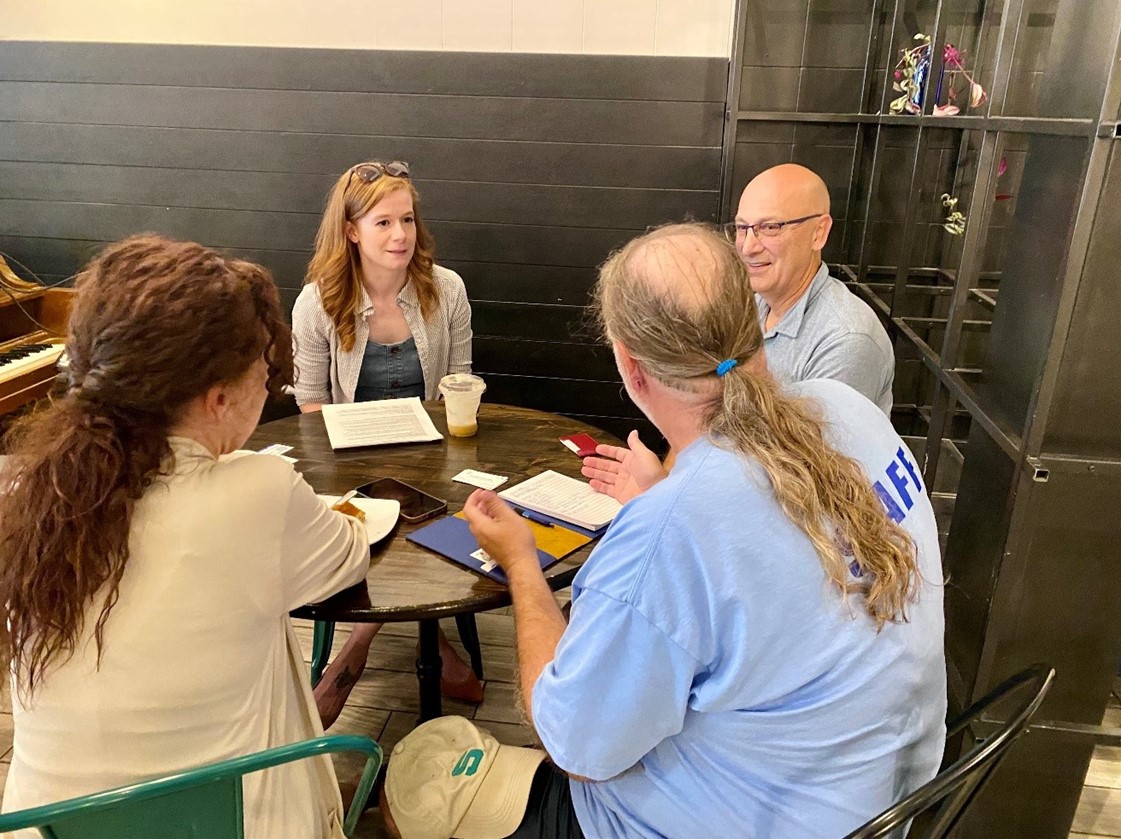
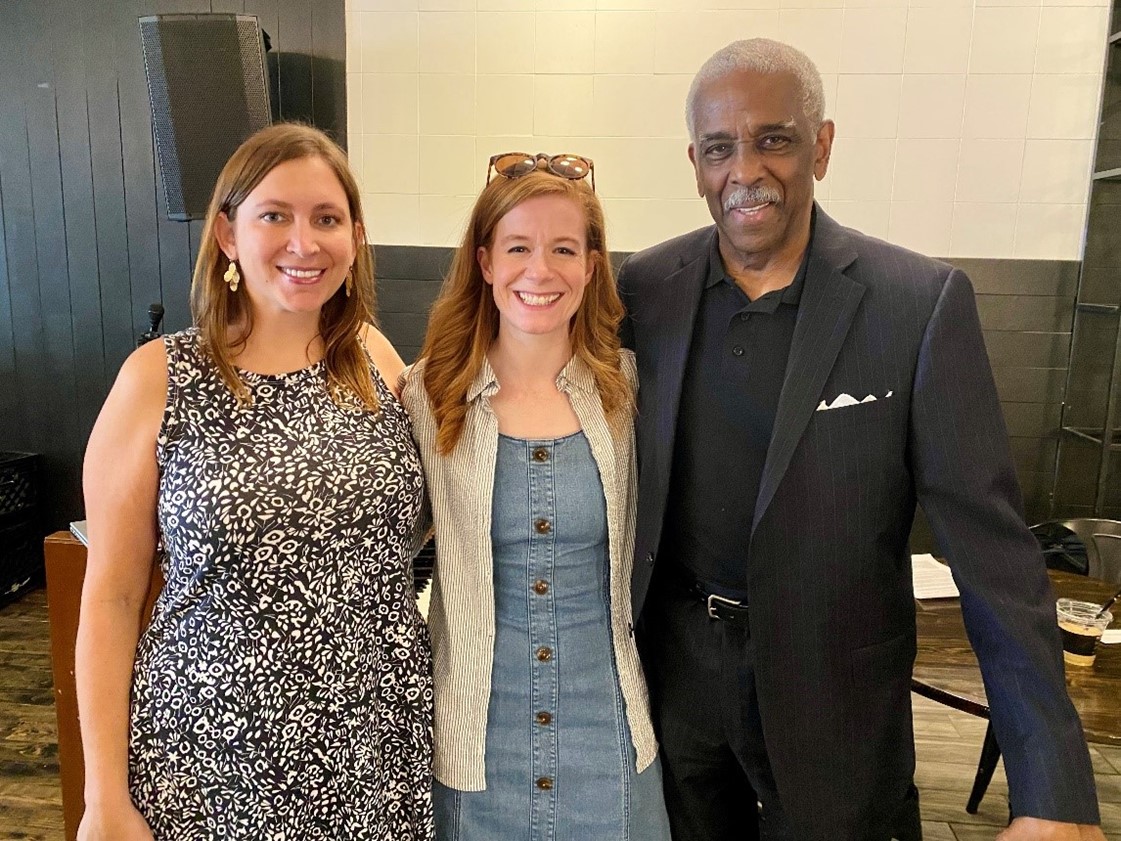
We had one of our constituent office hours at Dessert Oasis Coffee Roasters in Royal Oak last week.
I spoke with a Royal Oak resident and her colleague from Citizens Utility Board of Michigan. We discussed the importance for continued advocacy in support of more reliable power, cost-effective investment in renewable energy and against unfair rate increase requests. We heard about challenges from a family regarding Medicaid insurance and having a more transparent and straightforward process in navigating that system.
Lastly, Clawson based organization Team GUTS and Hunter Community Center expressed the need for creating permanent space for and prioritizing recreation for disabled members of our community.
We rotate these “office hours” around the district so constituents can sign up for a 1:1 meeting slot with me. The idea to launch this format came from reading that Governor Romney held office hours at the Capitol every Thursday morning. Any Michigan resident could meet with him face-to-face for five minutes. I loved the idea of carving out time that is protected and prioritized from the many directions this job tends to pull us in any given week.
Marygrove Community Association Meeting
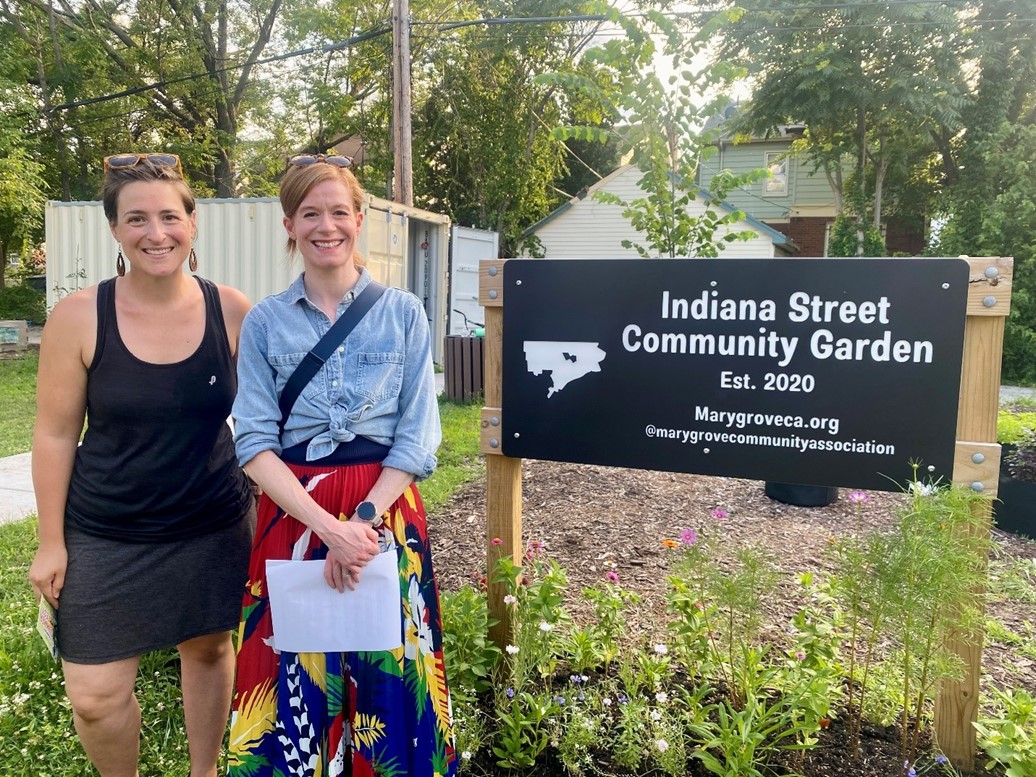
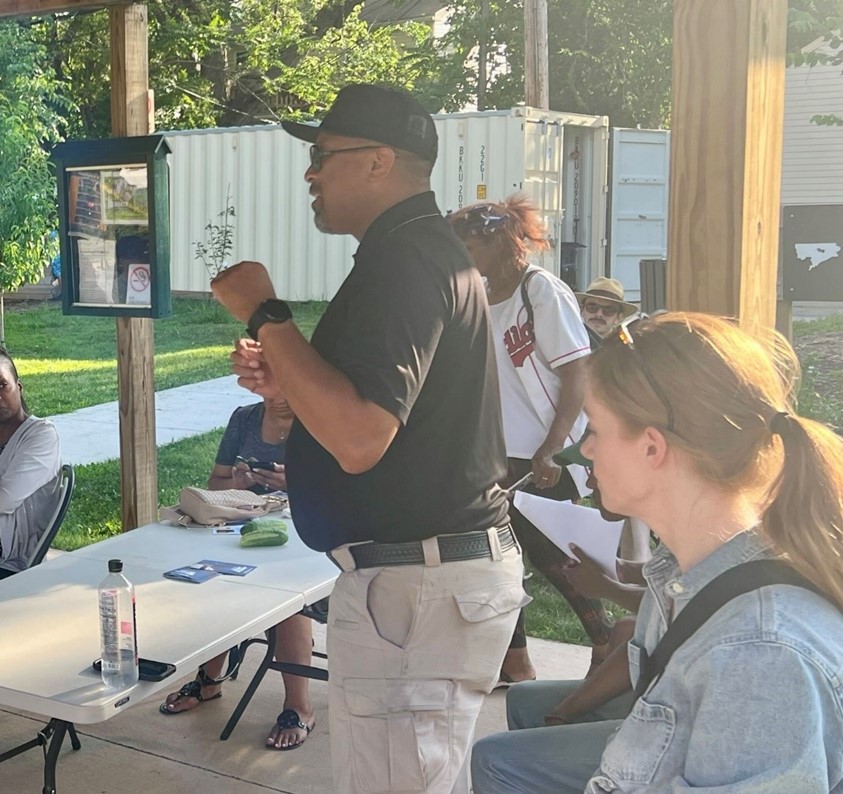
At the Marygrove Community Association meeting in Detroit this month, one of the things we talked about was my office working collaboratively with Councilwoman Angela Whitfield-Calloway on a proposed Amusement Tax. Michigan and Detroit stand out among other states and major cities, that have large sporting events and concerts, for not having something like this already. The price of a Lions season ticket increased by an average of 30%, and price hikes don’t create any new revenue for the city. Charging a small fee can unlock benefits for Detroit and across the state.
Michigan collected $285 million in sales taxes from amusement activities, according to 2022 U.S. Census data. Pennsylvania, for example, which charges a 5% statewide tax on admission for concerts, movies, sports and other events, collected $1.7 billion. We are looking at something that would likely have a cap of around $3 per ticket, being sensitive to ensure that everyone can have access to events without pricing people out.
Good News from the District

At a recent city commission meeting, The Royal Oak Police and Fire Department presented a check for $32,500 to Love, Team Tessa! They were able to do this with proceeds from their charity hockey and golf events. What an amazing example of community. Love, Team Tessa provides essential support to families raising a child with cancer, helping to shoulder the burden, and continually striving for a cure.
Find out more about Love, Team Tessa here.

Photo: Paul Miller/Getty Images
20-year-old Jaydin Blackwell of Oak Park is in Paris for the 2024 Paralympic Games as part of the men’s ambulatory sprints team! Jaydin was born with cerebral palsy, a disease that affects the ability to maintain balance and posture, and the type he has causes leg muscles to become rock hard.
The 2024 ESPY Award nominee had a world record qualifying time in the 100m T38 at the Para Athletics World Championships in Kobe, Japan which qualified him for the Paris games in that event. He will compete in the men’s 100- and 400-meter sprints for Team USA’s T38 classification, which is for track and field athletes with certain types of cerebral palsy.
We will certainly be cheering Jaydin on! Go Team USA!
